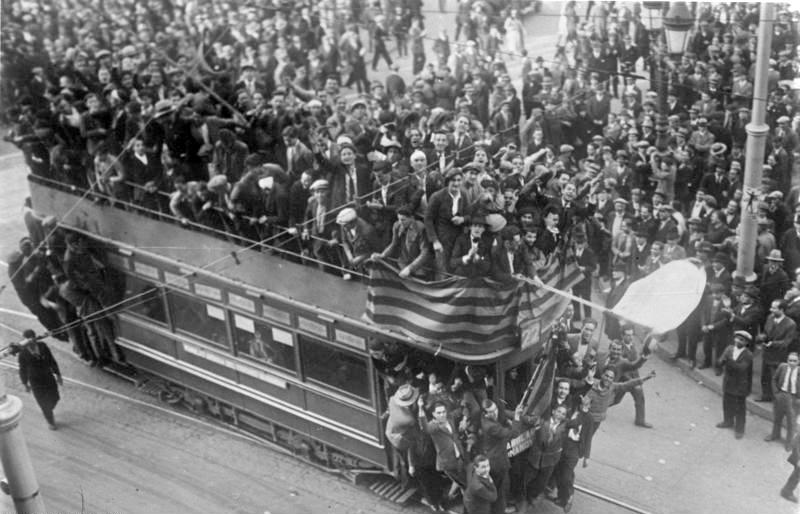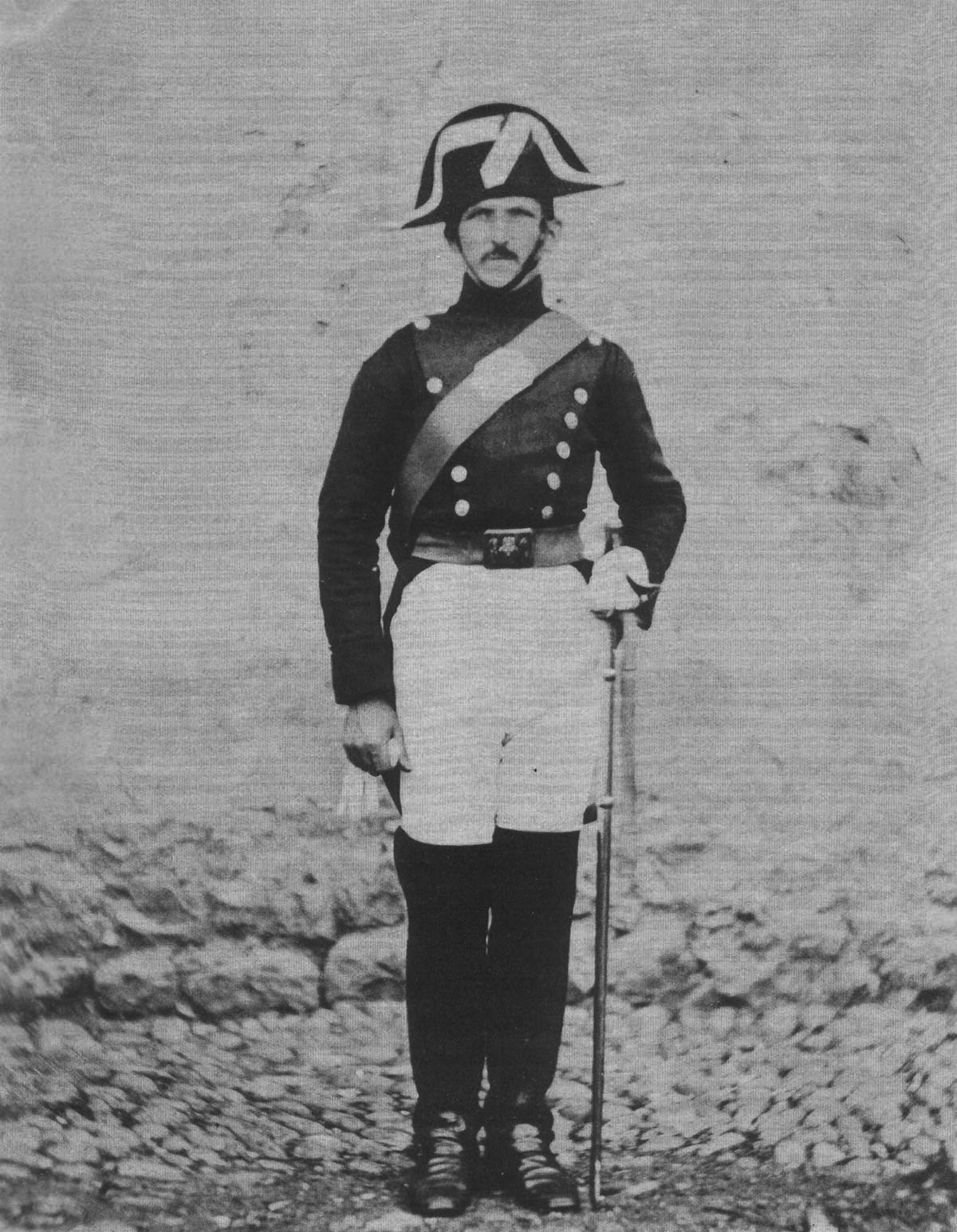|
Sanjurjada
Sanjurjada () was a military coup staged in Spain on August 10, 1932. It was aimed at toppling the government but not necessarily at toppling the Republic. Following brief clashes it was easily suppressed in Madrid. Hardly any action was recorded elsewhere except Seville, where local rebel commander general José Sanjurjo took control for some 24 hours but acknowledged defeat when faced with resolute governmental response. Due to his brief success and attention given during following trials, the entire coup has been later named after him. Background The Spanish military greeted the advent of the Republic with little enthusiasm, though also with no particular hostility. The officer corps tended to be rather monarchist than republican and rather conservative than liberal, but following last years of the dictatorship, which had compromised and discredited the army, most military men preferred to stay clear of politics. It was only when the new regime was set on a firmly leftward cour ... [...More Info...] [...Related Items...] OR: [Wikipedia] [Google] [Baidu] |
José Sanjurjo
José Sanjurjo y Sacanell (; 28 March 1872 – 20 July 1936), was a Spanish general, one of the military leaders who plotted the July 1936 ''coup d'état'' which started the Spanish Civil War. He was endowed the nobiliary title of "Marquis of the Rif" in 1927. A monarchist opponent of the Second Spanish Republic proclaimed in 1931, he led a ''coup d'état'' known as ''la Sanjurjada'' in August 1932. The authorities easily suppressed the coup and initially condemned Sanjurjo to death, then later commuted his sentence to life imprisonment. The government of Alejandro Lerroux - formed after the 1933 general election - eventually amnestied him in 1934. He took part, from his self-exile in Portugal, in the military plot for the 1936 coup d'état. Following the coup, Sanjurjo, expected by some to become the commander-in-chief of the Nationalist faction, died in an air crash on the third day of the war, when travelling back to Spain. He had chosen to fly in a small, overloaded ... [...More Info...] [...Related Items...] OR: [Wikipedia] [Google] [Baidu] |
Guardia Civil
The Civil Guard ( es, Guardia Civil, link=no; ) is the oldest law enforcement agency in Spain and is one of two national police forces. As a national gendarmerie force, it is military in nature and is responsible for civil policing under the authority of both the Ministry of the Interior and the Ministry of Defence. The role of the Ministry of Defence is limited except in times of war when the Ministry has exclusive authority. The corps is colloquially known as the ' (reputable). In annual surveys, it generally ranks as the national institution most valued by Spaniards, closely followed by other law enforcement agencies and the armed forces. It has both a regular national role and undertakes specific foreign peacekeeping missions and is part of the European Gendarmerie Force. As a national gendarmerie force, the Civil Guard was modelled on the French National Gendarmerie and has many similarities. As part of its daily duties, the Civil Guard patrols and investigates crimes in ... [...More Info...] [...Related Items...] OR: [Wikipedia] [Google] [Baidu] |
Infantry
Infantry is a military specialization which engages in ground combat on foot. Infantry generally consists of light infantry, mountain infantry, motorized infantry & mechanized infantry, airborne infantry, air assault infantry, and marine infantry. Although disused in modern times, heavy infantry also commonly made up the bulk of many historic armies. Infantry, cavalry, and artillery have traditionally made up the core of the combat arms professions of various armies, with the infantry almost always comprising the largest portion of these forces. Etymology and terminology In English, use of the term ''infantry'' began about the 1570s, describing soldiers who march and fight on foot. The word derives from Middle French ''infanterie'', from older Italian (also Spanish) ''infanteria'' (foot soldiers too inexperienced for cavalry), from Latin '' īnfāns'' (without speech, newborn, foolish), from which English also gets '' infant''. The individual-soldier term ''infantry ... [...More Info...] [...Related Items...] OR: [Wikipedia] [Google] [Baidu] |
Alejandro Lerroux Sentado
Alejandro is the Spanish form of the name Alexander. Alejandro has multiple variations in different languages, including Aleksander ( Czech, Polish), Alexandre (French), Alexandros ( Greek), Alsander ( Irish), Alessandro ( Italian), Aleksandr ( Russian), and Alasdair (Gaelic). People with the given name Alejandro * Alejandro Alvizuri, Peruvian backstroke swimmer * Alejandro Amenábar, Chilean-born Spanish director * Alejandro Aranda, American singer, musician, and reality television personality * Alejandro Arguello, Mexican footballer * Alejandro Avila, Mexican TV actor * Alejandro Awada, Argentine actor * Alejandro Betts, Argentine historian * Alejandro Bermúdez, Colombian swimmer * Alejandro Bustillo, Argentine architect * Alejandro Carrión, Ecuadorian poet and novelist * Alejandro Casañas, Cuban hurdler * Alejandro Castillo, Mexican footballer * Alejandro Cercas, Spanish politician * Alejandro Chataing, Venezuelan architect * Alejandro Cichero, Venezuelan footb ... [...More Info...] [...Related Items...] OR: [Wikipedia] [Google] [Baidu] |
José María Gil-Robles Y Quiñones
José María Gil-Robles y Quiñones de León (Salamanca, 27 November 1898 – Madrid, 13 September 1980) was a Spanish politician, leader of the CEDA and a prominent figure in the period leading up to the Spanish Civil War. He served as Minister of War from May to December 1935. In the 1936 elections the CEDA was defeated, and support for Gil-Robles and his party evaporated. As Civil War approached, Gil-Robles was unwilling to struggle with Francisco Franco for power and in April 1937 he announced the dissolution of CEDA, and went into exile. Abroad, he negotiated with Spanish monarchists to try to arrive at a common strategy for taking power in Spain. In 1968 he was named a professor of the University of Oviedo and published his book ''No fue posible la paz ('Peace Was Not Possible')''. He was a member of the International Tribunal at the Hague. After the death of Franco and the end of his regime, Gil-Robles became one of the leaders of the "Spanish Christian Democracy" pa ... [...More Info...] [...Related Items...] OR: [Wikipedia] [Google] [Baidu] |
Melquíades Álvarez (politician)
Melquíades Álvarez Gónzalez-Posada ( Gijón, May 17, 1864 - Madrid, August 22, 1936) was a Spanish Republican politician, founder and leader of the Reformist Republican Party ''(Partido Republicano Reformista)'', commonly known just as Reformist Party and President of the Congress of Deputies between 1922 and 1923. Biography He studied Law at the University of Oviedo (Asturias) and collaborated with Asturian liberal newspapers. He was friend of the famous writer Clarín and he started working as a lawyer in Oviedo. In 1898 he was elected to the Congress as Liberal candidate and was appointed Professor of Roman Law at the University of Oviedo. In 1899, he turned into Republican and in 1906 he was elected Republican congressman. He was one of the organizers of the Liberal Block in 1908 against the Conservative Prime Minister Antonio Maura and of the Republican-Socialist Conjunction in 1909. In 1912, he founded with Gumersindo de Azcárate and José Ortega y Gasset the Refor ... [...More Info...] [...Related Items...] OR: [Wikipedia] [Google] [Baidu] |
Alejandro Lerroux
Alejandro Lerroux García (4 March 1864, in La Rambla, Córdoba – 25 June 1949, in Madrid) was a Spanish politician who was the leader of the Radical Republican Party. He served as Prime Minister three times from 1933 to 1935 and held several cabinet posts as well. A highly charismatic politician, he was distinguished by his demagogical and populist political style. Biography He was initiated as Freemason around 1886 in the Madrid's Vetonica lodge of the Grand Orient of Spain, but his activity was limited, among other reasons due to his disillusion with the prospects this membership offered to his immediate purposes. Lerroux agitated as a young man in the ranks of the radical republicans, as a follower of Manuel Ruiz Zorrilla. He practised a demagogic and aggressive journalistic style in the diverse publications that he directed (''El País'', ''El Progreso'', ''El Intransigente'' and ''El Radical''). From the 1890s onwards Lerroux radicalized his discourse. His populist a ... [...More Info...] [...Related Items...] OR: [Wikipedia] [Google] [Baidu] |



.jpg)

